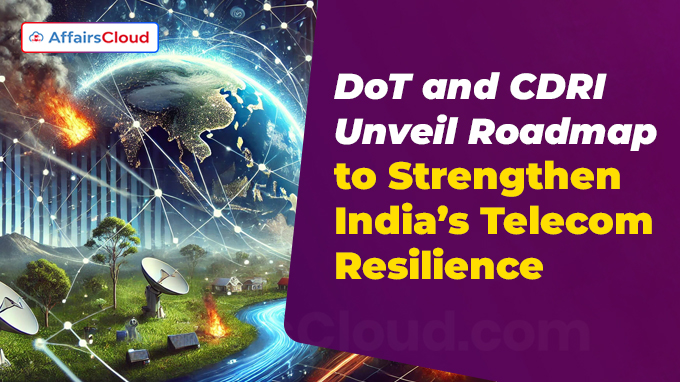 In February 2025, the Department of Telecommunications (DoT), Ministry of Communications (MoC), in partnership with the Coalition for Disaster Resilient Infrastructure (CDRI) unveiled a comprehensive report on Disaster Risk and Resilience Assessment Framework (DRRAF). This marks a significant step towards strengthening India’s telecom sector against disasters.
In February 2025, the Department of Telecommunications (DoT), Ministry of Communications (MoC), in partnership with the Coalition for Disaster Resilient Infrastructure (CDRI) unveiled a comprehensive report on Disaster Risk and Resilience Assessment Framework (DRRAF). This marks a significant step towards strengthening India’s telecom sector against disasters.
- The report was launched as part of a comprehensive study on National and Sub-national Disaster Risk & Resilience Assessment for the Telecommunication sector by CDRI.
- The study was conducted across 5 Indian states: Assam, Odisha, Tamil Nadu (TN), Uttarakhand, and Gujarat, which focuses on disaster risks and resilience strategies specific to the telecom sector.
- DoT coordinated with State Governments, Telecom Service Providers, and Infrastructure Providers to gather critical data.
Key Findings and Recommendations from the Study:
i.The study carried out a multi-hazard risk assessment across 0.77 million telecom towers. It mapped risks from floods, cyclones, earthquakes, and other disasters.
ii.A disaster risk and resilience index has been developed to examine the vulnerability of telecom infrastructure based on factors like: disaster intensity, frequency, and impact.
iii.The report has outlined certain recommendations which aimed to bolster the resilience and preparedness of the telecom sector against disasters.
- These recommendations are based on a multi-pronged approach, which combines technical improvements, government reforms, financial investments, and collaboration with various stakeholders.
iv.The key strategic recommendations of the report are: improving technical planning and design to ensure telecom infrastructure can tolerate disaster impacts.
- Creating a robust multi-hazard information repository or database to enable data-driven risk management.
- Implementing risk-informed governance to incorporate disaster resilience into sectoral policies.
- Developing risk-sharing instruments to protect telecom operators against financial frauds.
- Setting-up a cross-sectoral framework to promote stakeholder collaboration and coordinated response mechanisms.
- Strengthening financial arrangements to support the resilience of important telecom infrastructure.
- Promoting last-mile connectivity and information access which will ensure inclusivity during disaster-induced emergencies.
- Using digital and collaborative efforts to improve service restoration in crisis situations.
- Upscaling institutional capacity and last-mile expertise to enhance emergency preparedness.
- Implementing accurate monitoring mechanisms to improve service quality and reliability.
Significance of the Report:
i.The recommendations of the report aim to consolidate the telecom sectors’ ability to withstand disasters, which will ensure seamless connectivity and rapid restoration of services.
ii.With the leadership of DoT and multi-stakeholder engagement, the implementation of this roadmap will empower the telecom sector in India to effectively forecast, respond to, and recover from disasters, ensuring uninterrupted communication even in time of crisis.
iii.This risk and resilience study and framework will help CDRI to mainstream resilience principles in telecom infrastructure at the policy and planning level, and promote cross-sectoral collaboration and coordination, both at national and international levels.
About Coalition for Disaster Resilient Infrastructure (CDRI):
Prime Minister (PM) Narendra Modi announced the launch of CDRI at the United Nations(UN) Climate Action Summit held in New York, the United States of America (USA) on 23rd September, 2019.
- It is an international collaboration of 49 members dedicated to climate and disaster resilient infrastructure solutions. It is a collaboration of national governments, UN agencies and programmes, multilateral development banks (MDBs); and financing mechanisms, the private sector, and academia.
Director-General (DG)- Amit Prothi
Headquarters- New Delhi, Delhi
About Ministry of Communications (MoC):
Union Minister- Jyotiraditya Madhavrao Scindia (Constituency- Guna, Madhya Pradesh, MP)
Minister of State (MoS) – Chandra Sekhar Pemmasani (Constituency- Guntur, Andhra Pradesh, AP)




